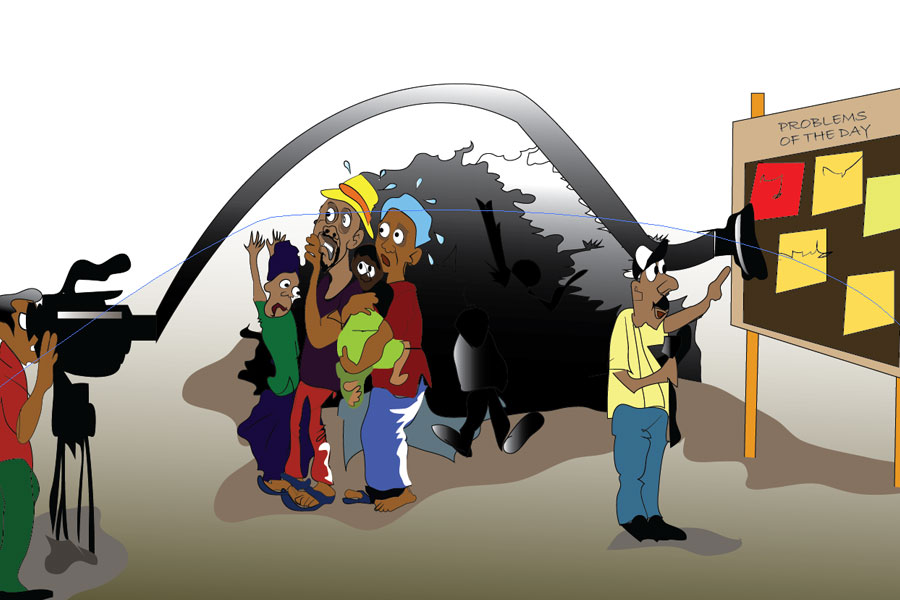
Verbatim | Jun 05,2021
Jan 16 , 2021
By Fikre Mariam Tsehai (PhD)
In a matter of less than half a century, the Ethiopian diaspora has grown from a few hundred to unprecedented low millions. The major reason behind this spike is the political, economic and social upheaval in 1974 that deprived Ethiopians of their civil and political rights. Students and political opponents were routinely detained, tortured and killed. The military government ruled through a reign of terror and fear.
During the nearly half a century old reign of Emperor Haile Selassie until 1974, the very notion of submitting oneself to a surrogate country, for whatever reason, was unthinkable and could even be perceived as a sign of betrayal of one’s own. This was true for a significant member of the Ethiopian population. It may be acceptable to reject a leader but not one’s country.
“Loyalty to a country, always; loyalty to a government, when it deserves it,” as Mark Twain said, was a motto that every Ethiopian was expected to live up to.
The notion of enat ager(mother homeland) or enatEthiopia connotes a mother who bears and nurtures a child; a mother who gives her all. Thus, like a child connected to the mother with the umbilical cord, Ethiopians were expected to see themselves being joined to the motherland through a metaphorical imaginary umbilical cord.
This thinking figured with the outlook of the diaspora before 1974. Not only was the number of Ethiopian refugees abroad extremely insignificant, but those few who chose to remain in exile had extremely compelling political reasons to permanently break with their country.
Those who were in the diaspora then hardly disavowed country, irrespective of the ethnic group they belonged to or which political views they espoused or religious faith they followed.
Seen against this background, the Ethiopians who left the country since the onset of the Ethiopian Revolution in 1974 were young men and women who had been numbed by the effects of war, human rights violations, fear, despair, and irresponsible and uncaring leadership.
The obvious and immediate negative impact from this migratory movement is that families were torn apart - parents separated from their offspring; children growing up in exile without parental guidance and entire communities were in disarray. By far, the most significant adverse impact from this movement is that the young men and women left their country with a deep sense of trauma perpetrated by their own leaders.
This was the beginning of a period where Ethiopian refugees that lacked feelings for their country would emerge. The concept of an Ethiopian ethos would falter, and the feeling of patriotism declined among the groups that were making it outside of the country. And finally, Ethiopia was to gradually lose its trained human capital – a process that took decades to build.
Later in the early '90s, the EPRDF regime that took over would place self-determination based on “nations, nationalities and peoples” as the central political doctrine of the Ethiopian Constitution. The concept of commonly shared history and historical unity of Ethiopians was vigorously and systematically attacked.
The effect of this historical process since the mid-1970s – first through a political process that pushed out citizens and later a political worldview that upheld ethnic political organisation - is seen in the manner with which members of the Ethiopian diaspora distinguish themselves. They now identify, first and foremost, with their ethnic groups and less and less with being a proud Ethiopian.
No doubt, the Ethiopian diaspora is made up of people having different ethnic backgrounds. It is also entirely possible to have multiple attachments - to one’s ethnic group as well as the homeland. At the same time, it is essential to remember that there are customs and tradition, shared values and common history that unite Ethiopians.
At the moment, the Ethiopian diaspora is hopelessly divided along ethnic lines.
Then the question is one of having to choose between celebrating these diversities or using them as divisive factors by encouraging intolerance and hate. It is one thing to appreciate one’s own ethnic identity, language, culture and religion. It is quite another to be a chauvinist.
In the end, what remains for Ethiopians is mixed ancestorship, shared history, culture and tradition. For instance, just two months ago, in reaction to President Trump’s reckless statement against Ethiopia, a cross-section of the diaspora rallied behind Ethiopia from coast to coast.
Thus, whenever there are issues affecting the country, the diaspora associations must continue to lobby their respective host governments to influence policy in favour of Ethiopia. As well, when policies in our homeland are such that they undermine Ethiopia’s unity and the rights of its citizens, the diaspora associations must speak up. The current political situation in Ethiopia is propitious to ignite this Ethiopian sentiment.
The Ethiopian government has recognised the role of the diaspora since the 1990s as shown by the establishment of the Diaspora Engagement Affairs Directorate-General within the Ministry of Foreign Affairs and the appointment of diplomats in Ethiopian embassies abroad that deal exclusively with diaspora affairs.
Unfortunately, most of the activities have been limited to providing consular services and garnering political support. There is also a tendency to restrict the importance of the diaspora to a source of remittances to Ethiopia.
This needs to be addressed. The diaspora has vital roles to play in other aspects of the country’s life. For instance, party leaders, as well as senior economic advisory positions in Ethiopia, are currently held by experts drawn from the diaspora. A significant number of professionals who are members of the newly established Council of Economic Advisors are also from the Ethiopian diaspora. All these are positive steps that will help fill the knowledge gap and ensure the transfer of expertise.
But the fruits of this can only be accomplished by mobilising the diaspora for the common good of Ethiopians to serve as a guiding light to transform the current crisis into an opportunity to begin our future history in the right direction. It would also require political dysfunction at home to be addressed. Creating engagement and organisation that transcends the current sharply drawn ethnic lines should be critical.
PUBLISHED ON
Jan 16,2021 [ VOL
21 , NO
1081]


Verbatim | Jun 05,2021

Commentaries | Jul 30,2022

Fortune News | Jul 29,2023

Commentaries | Feb 05,2022

Editorial | Jan 18,2019

My Opinion | Feb 19,2022

Viewpoints | Jul 22,2023

Editorial | Apr 11,2020

Fortune News | Dec 21,2019

Featured | Jan 01,2022

My Opinion | 131586 Views | Aug 14,2021

My Opinion | 127942 Views | Aug 21,2021

My Opinion | 125917 Views | Sep 10,2021

My Opinion | 123541 Views | Aug 07,2021

Dec 22 , 2024 . By TIZITA SHEWAFERAW
Charged with transforming colossal state-owned enterprises into modern and competitiv...

Aug 18 , 2024 . By AKSAH ITALO
Although predictable Yonas Zerihun's job in the ride-hailing service is not immune to...

Jul 28 , 2024 . By TIZITA SHEWAFERAW
Unhabitual, perhaps too many, Samuel Gebreyohannes, 38, used to occasionally enjoy a couple of beers at breakfast. However, he recently swit...

Jul 13 , 2024 . By AKSAH ITALO
Investors who rely on tractors, trucks, and field vehicles for commuting, transporting commodities, and f...

Jun 28 , 2025
Meseret Damtie, the assertive auditor general, has never been shy about naming names...

Jun 21 , 2025
A well-worn adage says, “Budget is not destiny, but it is direction.” Examining t...

Jun 14 , 2025
Yet again, the Horn of Africa is bracing for trouble. A region already frayed by wars...

Jun 7 , 2025
Few promises shine brighter in Addis Abeba than the pledge of a roof for every family...

Jun 29 , 2025
Addis Abeba's first rains have coincided with a sweeping rise in private school tuition, prompting the city's education...

Jun 29 , 2025 . By BEZAWIT HULUAGER
Central Bank Governor Mamo Mihretu claimed a bold reconfiguration of monetary policy...

Jun 29 , 2025 . By BEZAWIT HULUAGER
The federal government is betting on a sweeping overhaul of the driver licensing regi...

Jun 29 , 2025 . By NAHOM AYELE
Gadaa Bank has listed 1.2 million shares on the Ethiopian Securities Exchange (ESX),...